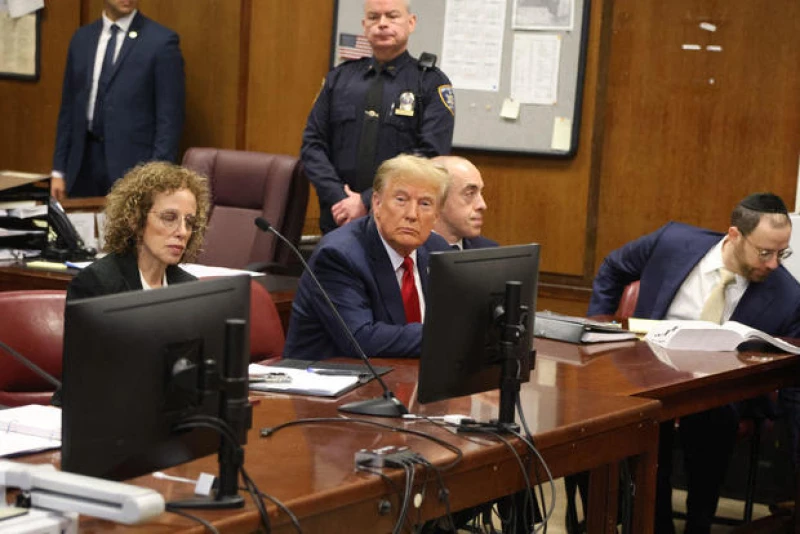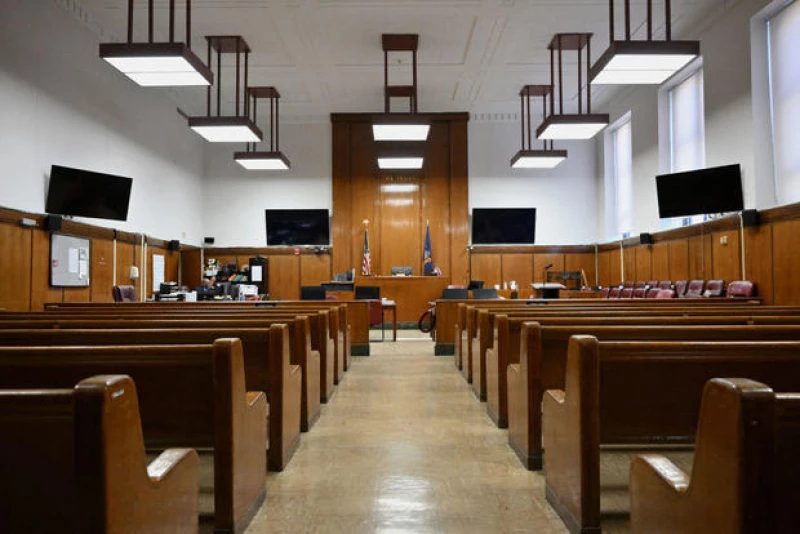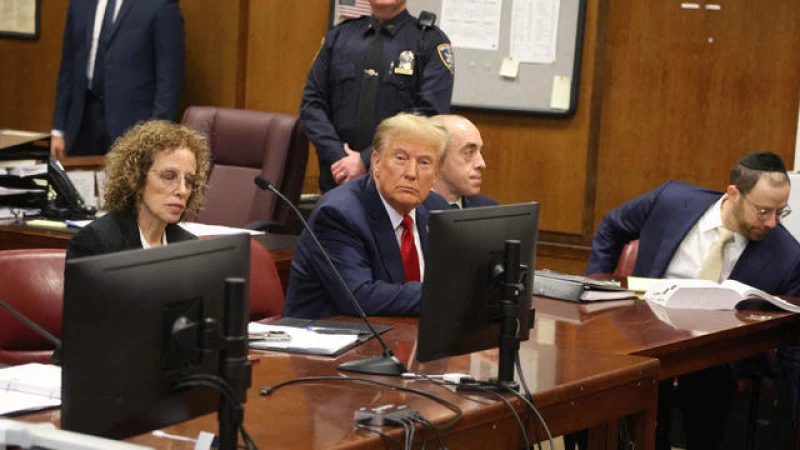The landmark criminal trial of former President Donald Trump is set to commence in a Manhattan courtroom on Monday, marking the first time a former president in U.S. history will face trial.
Despite multiple attempts by Trump to postpone the proceedings, Judge Juan Merchan is moving forward with the trial, denying Trump's requests and ensuring the trial's start.
The charges brought by Manhattan District Attorney Alvin Bragg revolve around allegations that Trump made a "hush money" payment to an adult film star to hide damaging information during the 2016 election campaign.
This trial is the first of four criminal cases involving the former president to reach the courtroom, coinciding with Trump's efforts to secure a second term in the White House. Trump maintains his innocence, pleading not guilty to all charges and asserting that the prosecutions are driven by political motives.
As jury selection commences on Monday, here's what you need to understand about the case:
Trump's Legal Troubles: Unpacking the Allegations
Delving into the core of this legal battle lies a transaction that transpired just days before Donald Trump ascended to the presidency in 2016. His then-lawyer, Michael Cohen, orchestrated a $130,000 payment to adult film actress Stormy Daniels, also known as Stephanie Clifford, to secure her silence regarding an alleged affair with Trump, an assertion the former president refutes.
Prosecutors contend that Trump subsequently repaid Cohen through a sequence of 12 monthly installments from the Trump Organization. These payments were meticulously recorded and portrayed as fees for ongoing legal services rather than reimbursements for the hush money. Trump faces 34 felony charges of tampering with business records and has entered a plea of not guilty.
Justice Juan Merchan is slated to elucidate the case's intricacies to prospective jurors utilizing the following language, as outlined in a court submission:
"The crux of the matter is the accusation that Donald Trump falsified business records to obfuscate an agreement with others aimed at illegitimately influencing the 2016 presidential election. Specifically, the contention posits that Trump manipulated business records to conceal the true purpose of payments directed to Michael Cohen, camouflaging them as remuneration for legal services provided under a retainer agreement. The prosecution asserts that, in reality, these payments were designed to reimburse Michael Cohen for funds disbursed to Stephanie Clifford, professionally known as Stormy Daniels, in the lead-up to the presidential election to forestall her from publicly disclosing particulars of a prior intimate encounter with Donald Trump."
Preview of Monday's Events

Monday marks the beginning of the trial with the selection of the jury. Over 500 Manhattan residents have received summonses to potentially serve as jurors. They will be required to complete a questionnaire covering various topics, from their occupations to whether they follow Trump on social media.
Prosecution's Perspective
According to Bragg, the core of the case revolves around Trump's alleged manipulation of New York business records to conceal criminal activities. These actions are believed to have obscured damaging information from the public during the 2016 presidential election.
In a radio interview in December, Bragg emphasized that the case pertains to a conspiracy to influence a presidential election and subsequent attempts to cover it up through falsified business records.
Trump's Response
Trump has consistently accused Bragg of using the case as a political tool and has attempted to link it to a broader conspiracy theory, despite lacking evidence. He has also criticized Merchan, alleging bias on the part of the judge.
In a recent social media post, Trump reiterated baseless claims about the case, characterizing it as an unjust attack on a political opponent. He further expressed concerns about facing a supposedly biased judge during the trial.
Trump's Speech Restricted by Court Order
Former President Donald Trump will have his speech restricted by a court order, although not in a literal sense. He is currently under a gag order that limits what he can say about the ongoing trial.
As of March 26, Trump was prohibited from making comments regarding potential witnesses, prospective jurors, court staff, lawyers in Bragg's office, and the relatives of any counsel or court staffer. However, he was still allowed to criticize Bragg and Merchan.
Trump's verbal attacks on the judge led to an expansion of the gag order by Merchan on April 1, preventing Trump from further public comments about the judge's family. Merchan emphasized that he was considering the well-being of potential jurors and their families.
"The average observer must now, after hearing [Trump's] recent attacks, draw the conclusion that if they become involved in these proceedings, even tangentially, they should worry not only for themselves, but their loved ones," Merchan stated. "Such concerns will undoubtedly interfere with the fair administration of justice and constitutes a direct attack on the Rule of Law itself."
Live-Streaming Not Permitted for Trial
There will be no live-streaming of the trial proceedings due to New York state law prohibiting the broadcasting of criminal cases. However, photographers will be permitted to capture images at the beginning of each day of the trial.
Who are Trump's lawyers?

Representing Trump in the trial are Todd Blanche, Susan Necheles, and Emil Bove, along with others. Blanche is leading Trump's defense in two separate federal criminal cases. Necheles has been a long-time attorney in Trump's circle and previously represented his company during a 2022 trial where two entities were fined for tax fraud committed by executives.
Where is the trial?
The trial is being held at the Manhattan Criminal Court, a historic courthouse that has served as the venue for processing cases for New Yorkers encountering the criminal justice system for over eight decades.
Will Trump attend the trial?
Yes, Trump is required to be present at the trial as defendants in New York criminal cases must attend unless they request a waiver, which Trump has not done.
Will Trump testify?
Estimation of Trial Duration
Anticipations from court personnel and legal representatives on both sides suggest that the trial is likely to span between six to eight weeks. The proceedings are scheduled for four days a week, specifically on Mondays, Tuesdays, Thursdays, and Fridays, with allowances made for holidays.
Initial presentations will be made by the prosecution, followed by the defense team.
Potential Sentencing for Trump
Should Trump be found guilty, the possibility of a prison sentence exists. Each charge leveled against Trump carries a maximum penalty of four years' imprisonment. Notably, Trump would be classified as a first-time, nonviolent offender. The presiding judge holds significant discretion in determining the sentence, which could range from no prison time to the full four-year term.







